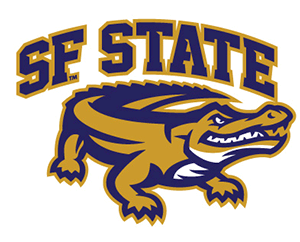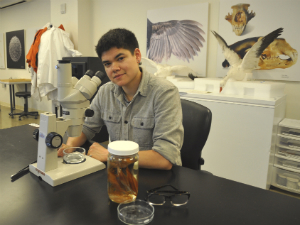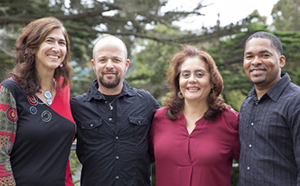Making the Future Happen: Academic Year '14-15
It's been a big year for San Francisco State University. The University introduced a new strategic plan, the Gator mascot mark received an update, several students won national awards, faculty published significant research and millions of dollars in grants paved the way for future successes.
These are some of the many highlights of the 2014-15 academic year as covered by SF State News:
University milestones
The fall 2014 semester kicked off with Welcome Days, a week of activities designed to orient more than 7,000 new Gators and their families to campus life. Festivities included a dance party, community-service projects, an impromptu concert and welcome speeches from President Les Wong and other administrators.

In 2014, the University unveiled its new Gator mascot mark.
The University also started the school year with an enthusiastic new athletic director, Charles Guthrie, as well as new coaches for women's basketball, men's soccer and women's track and field. In September, the University debuted its renovated Gymnasium and dedicated the Don Nasser Family Plaza, formally completing the $2 million upgrade and recognizing Nasser (B.A. '63), whose donation made the renovations possible. And that wasn't the only big change in athletics: In August, SF State released its new Gator mascot mark -- more modern and with a bit of an edge.
SF State also commemorated a noteworthy moment in the University's history: the College of Ethnic Studies' 45th anniversary. In 1969, SF State became the first university in the nation to introduce ethnic studies into its curriculum, establishing the field as an academic discipline. On the occasion of the anniversary, a visiting professorship in social justice was created at the College with a gift from longtime University supporters George (B.A. '65) and Judy (B.A. '62) Marcus.
The University also made an important stride in paving the way for its future. In December, after a year and a half of information gathering, outreach and discussion, SF State unveiled its new strategic plan, which outlines short-, mid- and long-term goals for the University based on five core values: Courage, Life of the Mind, Equity, Community and Resilience.
Student successes

Shayle Matsuda received the California State University Trustees Award, the CSU's top student honor.
In September, graduate student Shayle Matsuda was awarded the California State University Trustees Award, the highest student distinction within the CSU system. A biologist, Matsuda studies nudibranchs, marine mollusks commonly known as "sea slugs." He has also navigated life-changing personal events: surviving cancer and undergoing a gender transition.
Junior Liana Derus helped overturn an outdated city law. She entered a contest that asked students to point out unnecessary elements of the city's legal code and won with her suggestion to eliminate an ordinance requiring gas stations to have separate bathrooms for men and women. In January 2015, the ordinance was thrown out.
Six students who visited Fukushima, Japan, to report on the ongoing recovery efforts after the 2011 earthquake, tsunami and nuclear disaster created the Facing Fukushima website to share their photographs, stories and broadcasts telling the stories of residents who are rebuilding their lives.
This spring, students from the Broadcast and Electronic Communication Arts department won big at the Broadcast Education Association's 2015 Festival of Media Arts, and members of SF State's forensics team competed in national tournaments. In May, 12 outstanding undergraduate and graduate students were chosen to represent their peers at Commencement by wearing their college's academic hood.
Faculty achievements
Faculty members made important research contributions in a variety of fields, some of which include:
- Research by Professor of Biology Jonathon Stillman found that porcelain crabs can adapt to global warming but will not have energy for much else beyond basic survival.
- Assistant Professor of Physics Stephen Kane defined the concept of a "Venus zone" around stars, where the atmosphere could be consumed by a runaway greenhouse effect that superheats its planets, making them unlivable.
- Children of recently separated or divorced families are likelier to drink sugar-sweetened beverages than children in families with married parents, according to research by Jeff Cookston, professor of psychology.
- A study by Professor of Biology Gretchen LeBuhn found that native bees are able to provide adequate pollination service in San Francisco, despite its urban setting.
- Restrictions on selling junk food in California public schools helped control childhood obesity levels but had a more profound effect on students attending schools in wealthier neighborhoods, according to a study by Emma V. Sanchez-Vaznaugh, associate professor of health education.
Faculty members also published noteworthy books, such as:
- "California Mushrooms: The Comprehensive Guide" by Professor of Biology Dennis Desjardin, which details 650 species of mushrooms
- "No Simple Highway: A Cultural History of the Grateful Dead" by Peter Richardson, a lecturer in humanities, which explores the band's incredible popularity
- "Arresting Dress: Cross-Dressing, Law, and Fascination in Nineteenth-Century San Francisco" by Associate Professor of Sociology and Sexuality Studies Clare Sears, which investigates a law that made it illegal to cross-dress in public in San Francisco from 1863 until 1974
- "Polarization and the Presidency: From FDR to Barack Obama" by Professor of Political Science Robert C. Smith, which chronicles the history of controversy surrounding the United States presidency
A graphic novel by Professor of History Trevor Getz based on the true story of an escaped slave who took her former master to court won the James Harvey Robinson Prize from the American Historical Association.
Sculptor and Assistant Professor of Art Michael Arcega was selected to participate in the Artist in Residence Program at Recology San Francisco, creating an exhibit made almost entirely of repurposed garbage.
A school of nursing in Kenya was named in honor of School of Nursing Director Mary Ann van Dam in recognition of her years of volunteer work in the country.
Support for students

The National Institutes of Health awarded SF State $17 million dollars to address issues of workforce diversity in biomedical research. The faculty team behind SF BUILD is pictured.
SF State received a major award to help prepare minority students for STEM careers. The National Institutes of Health grant of $17.04 million supports the University's efforts to address issues of workforce diversity in biomedical research by testing models of training and mentoring to attract students to STEM fields.
The State of California gave a $3 million "Award for Innovation in Higher Education" to the Metro College Success Program, which serves primarily underrepresented, low-income, first-generation students as they navigate their first two years of college. The funding will be used to expand the Metro program, which has proven successful in helping students thrive academically and improving retention rates.
Other awards included a U.S. Department of Education grant of almost $1 million to prepare educators to serve the deaf-blind community and a federal Health Resources and Services Administration grant of $1.2 million to bolster the University's efforts to train counselors to work with families from diverse populations.
Sustainability initiatives
SF State demonstrated its commitment to sustainability through events such as Farm to Fork, a vegetarian lunch made exclusively of organic ingredients grown within 250 miles of campus.
In the spring semester, the campus debuted a revamped shuttle bus system with a fleet of larger, more eco-friendly buses with better wheelchair accessibility.
Of particular relevance given the severe drought, SF State announced that the pilot test of "smart" irrigation controls that can turn themselves on or off based on weather and water flow has resulted in a 30 percent reduction in water use on the Maloney baseball field.
Community engagement
Through SF State's distinctive community-service learning program, students build on their classroom experience through volunteer work. This year, student volunteer efforts included mentoring youth detained in San Francisco's juvenile hall, providing Mexican nationals information about educational opportunities in the United States, teaching sewing skills to inmates in a county jail and improving conditions at some of San Francisco's most distressed public housing sites.
To keep up to date on SF State news, visit http://news.sfsu.edu and follow the University on Twitter, Facebook, Instagram and Pinterest.